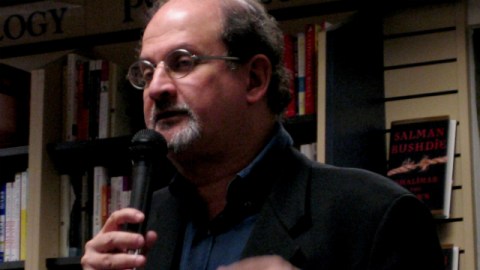On Salman Rushdie and My Apostasy

Salman Rushdie has an excerpt in The New Yorker from his third-person narrated memoir Joseph Anton – the name he lived under during his time with the Fatwa*. There are few things I can definitely point to that changed my life, so please forgive this brief sojourn into autobiography. One of these things is his book that resulted in the Fatwa: The Satanic Verses.
As you can probably tell from my awkward name and even more terrible surname, it’s Arabic, which more than likely identifies my relation to Islam and Muslim culture. As should be obvious to anyone who’s read me, I am very much not Muslim. I am, in fact, the furthest thing from Muslim it’s possible to be, aside from being a blind, deaf Martian: I’m an apostate, a murtat, an infidel of the worst kind (in that I’m not ashamed). For many, this statement could publicly result in death: whether by certain Islamic law or sheer antagonism by God’s most ardent messengers. Think about this: Today, while we’re scanning the surface of Mars with a beautiful ton of human ingenuity, there are places on this planet where you stillcan’t publicly deny a mythical being.
For defensive Muslims, I was “blessed” with the gift of Islam, the blanket of faith, to wrap myself in against the cold wind of horror that is reality, but I’ve since discarded it. I denied this beautiful gift, this rare and important property. I’ve been told by grown men who starve themselves from dawn-till-dusk for a month, but have extramarital affairs, of how morality cannot exist without god; I’ve been told by women in full-black garb, with their hands full of babies and half-cooked meals for their cheating husbands, that there is no reason to live unless it is under the gaze of a loving god. Thankfully, my own family has been accepting of me and I am grateful for that.
As with most people, when I was younger, the blanket of faith was more a skin; I saw no difference between me and my Islam. I was memorising and reciting half of an Arabic tome by the age of ten, with little to know idea of its actual content; I knew the history of ancient Bedouin tribes better than the history of my country, South Africa, where black people were constitutionally oppressed by the government; I could more quickly tell you Muhammad’s wives’ names than identify Nelson Mandela. The skin blinded me, hardened, and only later did it rip when it was wounded by Rushdie’s words.
The skin became a scab, and I picked at it with every biting undermining of faith, every stab at assumed holiness, every cutting antagonism toward belief in Allah – the Muslim term for God – that came from Rushdie’s characters. Rushdie’s words, like an exquisite assassin’s blade whose beauty makes you forget your throat is slit, stayed with me for days. Like flies, his thoughts and anger followed me. I can still smell the original copy.
But why did this book have this impact on a normal “Muslim child”? Unless you’ve experienced Muslim culture, it is difficult to convey just how much Rushdie taps into – as someone enveloped in it, who knows the warmth of the blanket, who knows the tightness of the skin, the hardness of the scab. To explain any Rushdie book is a manuscript or essay unto itself and there is little use here. However, the bedrock of his entire novel rests on an incident recognised by Muslim authorities as legitimate; but, if true, has deep repercussions for faith in general – let alone the faith of Islam.
Satanic Verses in Islamic History
According to the history of Islam, Muhammad heard Allah’s words via the angel Gabriel (or Jibreel), usually from a cave atop a mountain. When attempting to take over the city of Mecca, Muhammad was conflicted about how to integrate three existing goddesses already receiving attention – and therefore who were economically important. The goddesses, Al-Lat, Al-Manat, and Al-Uzza, even had temples just outside the city gates. Rushdie relates:
The historical record is incomplete, but most of the major collections of hadith, or stories about the life of the Prophet—those compiled by Ibn Ishaq, Waqidi, Ibn Sa’d, and Tabari—recount an incident that later became known as the incident of the “Satanic Verses.” The Prophet came down from the mountain one day and recited verses from what would become Surah—or chapter—No. 53 [in the Quran]. It contained these words: “Have you thought on al-Lat and al-Uzza, and, thirdly, on Manat, the other? They are the Exalted Birds, and their intercession is desired indeed.”
This meant the goddesses could be worshipped alongside Allah, just as followers respected angels and other “lesser beings” to God. However,
At a later point—was it days or weeks, or months?—Muhammad returned to the mountain and came down, abashed, to state that he had been deceived on his previous visit: the Devil had appeared to him in the guise of the Archangel, and the verses he had been given were therefore not divine but satanic and should be expunged from the Koran at once.
Note this is an incident not made up by opponents of Islam, but devote biographers and chroniclers of The Prophet, like Al Tabari. Many people falsely assume Rushdie made up the incident and that this was what Muslims hate: instead, the reality is far worse. Here was an actual example of The Prophet displaying the human property of fallibility.
The Echoes of Fallibility
Muhammad’s non-deification has always been an important part of the faith; but as Christopher Hitchens and others have pointed out, this need to not deify Muhammad has itself become deified: teachers naming bears are threatened, depictions from cartoonists result in attacks. But you can see why: if Muhammad was wrong about what God did or didn’t say here, where else could Muhammad have been wrong?
When this realisation hit me, I recognise that even if there were a perfect god, how could we as imperfect beings make sense of him? How could a loving god create such horror and strife? As Rushdie humanised Muhammad – as he was always meant to be – Rushdie also humanised the faith. And the silver bullet for all monotheisms is the recognition that they’re manmade.
The scab was torn, the skin was shed, the blanket discarded. Left to an ethical void, I recognised that I needed morality to fill it. I can’t be sure what I’m right about. Like Muhammad, we should recognise our failings. But unlike Muhammad we shouldn’t pretend that even when we’re not wrong, we’re absolutely right. We can’t be.
This recognition of being cosmically-alone, of being cognitively-biased and blundering, is however true. It means asking: What else am I wrong about? What else are others wrong about? The refusal to accept easy answers – as if from a beautiful angel – became my consistent focus, much to the annoyance of everyone I love.
So, when you ask me, dear readers, (even though this is irrelevant to the argument) what type of person asks whether incest is moral, what type of person thinks about the ethics of sex work, it’s the type of person who no longer accepts a second skin of hand-me-down assertions. from atop a mountain called tradition.
Rushdie humanised and, thereby, destroyed what was meant to be above mere humanity, what was relegated to the realms of sanctity; in so doing he incited the wrath of fundamentalists, but also my “eternal” gratitude and adoration. I urge you to read his account to see how hard it is to defend reason, when all the world appears to be against you. Even if you hate him as a writer, he deserves nothing but respect as an advocate of reason despite (ongoing) hostilities.
—
* Lovers of classical literature could probably spot the name alludes to Joseph Conrad and Anton Chekov
Image Credit: Ken Conley aka kwc (source)





